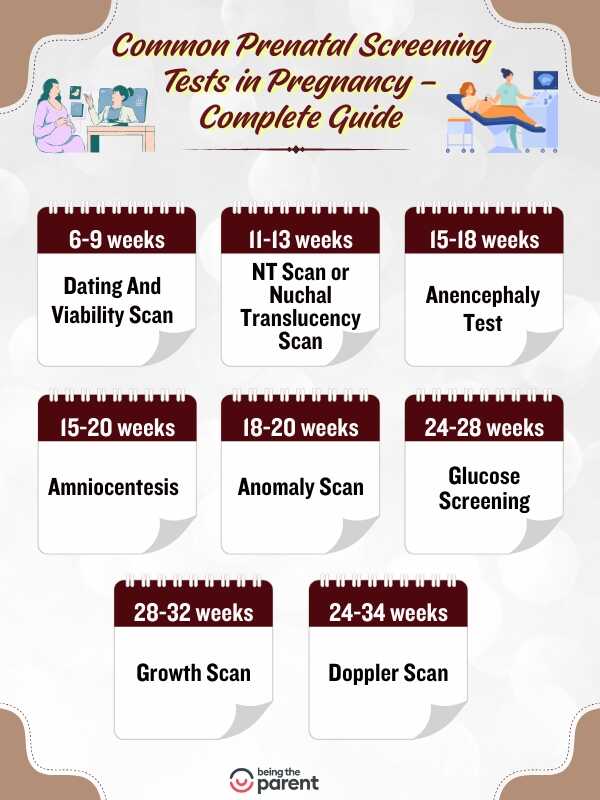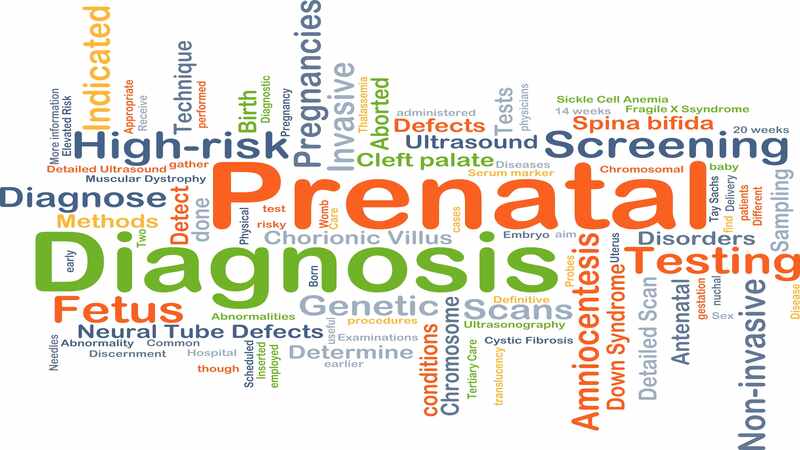 As soon as a woman’s pregnancy is confirmed, she becomes extra vigilant about her health, recognizing the need to care for another precious life. Feeling anxious before hospital visits is understandable, as no woman would like to face any hurdles during this beautiful pregnancy journey.
As soon as a woman’s pregnancy is confirmed, she becomes extra vigilant about her health, recognizing the need to care for another precious life. Feeling anxious before hospital visits is understandable, as no woman would like to face any hurdles during this beautiful pregnancy journey.
Preparing yourself for prenatal screening tests can be intimidating. Rest assured, as most of the screening tests are routine and painless. The main aim is to ensure the health of your baby and you. Read on for more information to alleviate your doubts about prenatal screening tests.
What Are Prenatal Screening Tests?
Prenatal screening tests refer to a variety of tests that your healthcare provider will recommend during different stages of pregnancy. They help in identifying any problems that could affect a pregnant woman or her unborn baby. The main aim is to identify genetic disorders and birth defects in the fetus [1]. If detected early on in the pregnancy, the pregnancy and potential health of the fetus can be well managed.
When Are Prenatal Screening Tests Done?

Prenatal screening tests can begin as early as 10 weeks of pregnancy [2]. They include the first-trimester screening tests. They include an array of blood tests and ultrasound scans.
Second-trimester screening tests are carried out around the weeks 15-18 of pregnancy [3]. An additional ultrasound scan that studies the baby’s anatomy happens at around 18-22 weeks [4]. Any abnormality in any of the screening tests necessarily needs follow-up with diagnostic tests that can give more precise information about your baby.
[Read: When Will I Have My First Scan During Pregnancy?]
Why Are Prenatal Screening Tests Important?
Screening tests act as an important tool in identifying any potential health issues in the mother or the fetus at an early stage. Most importantly, they help in assessing:
Birth Defects
Early screening using a combination of blood tests and ultrasound helps identify certain birth defects in the fetus [5]. This includes screening for neural tube defects like spina bifida, a cleft lip or palate, etc.
Genetic and Chromosomal Conditions
Screening tests help in the early detection of various chromosomal anomalies like Down Syndrome, Edward Syndrome, etc. They also help in detecting genetic disorders like gestational diabetes, sickle cell anemia, etc. This early detection helps in an early intervention and the best possible management.
What Are Screening Tests And Diagnostic Tests?
 Prenatal tests include both screening and diagnostic tests, which are different from each other. Though, the main aim of these tests is to identify potential health concerns in the fetus.
Prenatal tests include both screening and diagnostic tests, which are different from each other. Though, the main aim of these tests is to identify potential health concerns in the fetus.
Screening tests
The main purpose of screening tests is to identify high-risk pregnancies, chromosomal anomalies, and certain birth defects [6]. For e.g: first-trimester screening for identifying the risk of chromosomal anomalies like Down Syndrome and screening for gestational diabetes. These tests are mostly Non-Invasive, consisting of blood tests and ultrasounds.
Diagnostic Tests
Diagnostic tests during pregnancy are generally done to confirm any abnormality. In other words, it helps in ruling out or confirming conditions after a screening test comes up positive [7]. These are generally more invasive and give definitive results. Amniocentesis and chorionic villus sampling are examples of diagnostic tests that help in detecting genetic disorders.
Common Prenatal Tests During Pregnancy
Various screening and diagnostic tests usually involve an array of blood tests, imaging, etc. to assess the overall health of both the mother and the growing fetus. These tests include:
Blood Tests
Blood tests play an important role in detecting certain health issues. The common tests done using blood samples include:
Complete Blood count – This helps in detecting cases of anemia and other infections [8]. Basically, it checks the overall health of the pregnant woman.
Blood group and Rh type– It is really important to know the blood type of the pregnant woman before labor and delivery. This helps in preventing complications of Rh incompatibility and in arranging blood in cases of severe blood loss during delivery.
Infectious diseases– Conditions like Hepatitis, HIV, and syphilis can be ruled out using blood tests.
Glucose testing– Blood samples taken during various stages of pregnancy help in the detection of gestational diabetes [9].
Urine test
Urine analysis is routinely done in all pregnant women to look for kidney functions and rule out urinary infections, which are quite common in pregnancy[10]. The presence of glucose in the urine also helps in assessing gestational diabetes.
Blood Pressure Measurement
Blood pressure monitoring is crucial for both the health of the mother and the baby. It helps in detecting gestational hypertension and preeclampsia, which can prove fatal to both the mother and the fetus [11].
Ultrasound
Ultrasound plays an important part in the confirmation of pregnancy and the monitoring of fetal development. Anatomy scans help in detecting various structural anomalies.
Prenatal Tests Done in The First Trimester
Certain prenatal tests done in the first trimester helps ensure early detection and better management of the pregnancy. Typically, they involve ultrasound, blood tests, and urine tests to look for an overall health assessment. Blood tests like Complete blood counts, Blood groups and typing, and screening for infectious diseases are done in the first trimester [12]. Genetic screening for Down Syndrome is also carried out in the first trimester. They help in the detection of chromosomal abnormalities and birth defects. Some parents choose to get NIPT early in the first trimester to evaluate the risk of genetic conditions.
[Read: What to Expect On the First Appointment With a Gynecologist?]
Prenatal Tests Done in The Second Trimester
Between weeks 15 and 27 of pregnancy, certain second-trimester prenatal tests are conducted. An anatomy scan is an important, detailed scan carried out in the second trimester. Screening for gestational diabetes is also done during this time. Quad screening using blood samples is also a second-trimester test that evaluates chromosomal anomalies and birth defects [13]. More invasive diagnostic tests like amniocentesis and chorionic villus sampling are also done in the second trimester if required.
Prenatal Tests Done in The Third Trimester
Between week 28 of pregnancy and birth, several third-trimester prenatal tests are conducted to evaluate maternal and fetal health. A growth scan is generally performed in the third trimester to look for fetal development. Non-stress tests and biophysical profiles are conducted to assess fetal well-being. Screening for group B Streptococcus bacteria is also fine between 35 and 37 weeks [14].
Therefore, prenatal tests play a vital role in achieving a smooth and healthy pregnancy. Once your pregnancy is confirmed, make sure that you discuss all common prenatal tests that are necessary for you. Keep track of these tests and mark the dates on a calendar to ensure that you do not miss any of the appointments.
FAQ’s
1. What Is The Most Common Prenatal Test?
First-trimester screening, which involves maternal blood testing and fetal ultrasound, is the most common form of prenatal testing. It can help in identifying the risk of chromosomal conditions like Down Syndrome.
2. What Are Some Tests Advised On A First Prenatal Visit?
On your first clinic visit during pregnancy, your doctor will do an ultrasound scan to confirm the gestational age. Additional blood tests help to evaluate for complete blood counts, including hemoglobin levels and blood group Rh typing, and rule out infections like HIV, hepatitis B, and syphilis.
3. What Tests Are Included In The Prenatal Profile?
The prenatal profile comprises a panel of tests including hemoglobin levels, blood type, Rh factor, blood glucose levels, and screenings for common infections such as HIV, Rubella, and syphilis. It also includes routine ultrasound scans to monitor fetal development, along with assessments of glucose and protein levels in the urine. These tests are essential for monitoring maternal health and fetal well-being.
4. What 3 Things Are Checked In A Pregnant Lady At Each Prenatal Visit?
Pregnancy requires a lot of hospital visits. During these visits, your doctor will check for your vitals, including blood pressure, track your weight to ensure healthy fetal growth and monitor fetal heart rate using ultrasound or a fetal Doppler.
[Read also: How To Calculate Pregnancy Weeks And Months?
References
- Genetic Alliance; The New York-Mid-Atlantic Consortium for Genetic and Newborn Screening Services. Understanding Genetics: A New York, Mid-Atlantic Guide for Patients and Health Professionals – https://www.ncbi.nlm.nih.gov/books/NBK115544/
- ACOG, Prenatal Genetic Screening Tests – https://www.acog.org/womens-health/faqs/prenatal-genetic-screening-tests
- Stanford Medicine children’s Health, Second Trimester Prenatal Screening Tests – https://www.stanfordchildrens.org/
- Jabaz D, Jenkins SM. Sonography 2nd Trimester Assessment, Protocols, and Interpretation. [Updated 2023 Nov 12] – https://www.ncbi.nlm.nih.gov/books/NBK570574/
- Driscoll DA, Gross SJ; Professional Practice Guidelines Committee. Screening for fetal aneuploidy and neural tube defects. Genet Med. 2009 Nov;11 – https://www.ncbi.nlm.nih.gov/pmc/articles/PMC3111043/
- Genetic Alliance; The New York-Mid-Atlantic Consortium for Genetic and Newborn Screening Services. Understanding Genetics: A New York, Mid-Atlantic Guide for Patients and Health Professionals. Washington (DC): Genetic Alliance; 2009 Jul 8 – https://www.ncbi.nlm.nih.gov/books/NBK115544/#
- Maxim LD, Niebo R, Utell MJ. Screening tests: a review with examples. Inhal Toxicol. 2014 Nov;26 – https://www.ncbi.nlm.nih.gov/pmc/articles/PMC4389712/
- Mayo Clinic, Complete blood count (CBC) – https://www.mayoclinic.org/tests-procedures/complete-blood-count/
- Rani PR, Begum J. Screening and Diagnosis of Gestational Diabetes Mellitus, Where Do We Stand. J Clin Diagn Res. 2016 Apr;10 – https://www.ncbi.nlm.nih.gov/pmc/articles/PMC4866200/
- American Pregnancy Association, Getting a Pregnancy Urinalysis: About Prenatal Urine Tests – https://americanpregnancy.org/prenatal-testing/urine-test-urinalysis/
- ACOG, Routine Tests During Pregnancy – https://www.acog.org/womens-health/faqs/routine-tests-during-pregnancy#.
- ACOG, Getting a Pregnancy Urinalysis: About Prenatal Urine Tests – https://americanpregnancy.org/prenatal-testing/urine-test-urinalysis/
- ACOG, Quad Screen Test – https://americanpregnancy.org/prenatal-testing/quad-screen/
- Morgan JA, Zafar N, Cooper DB. Group B Streptococcus and Pregnancy. [Updated 2023 Jul 24]. In: StatPearls [Internet]. Treasure Island (FL): StatPearls Publishing; 2024 Jan – https://www.ncbi.nlm.nih.gov/books/NBK482443/#:
